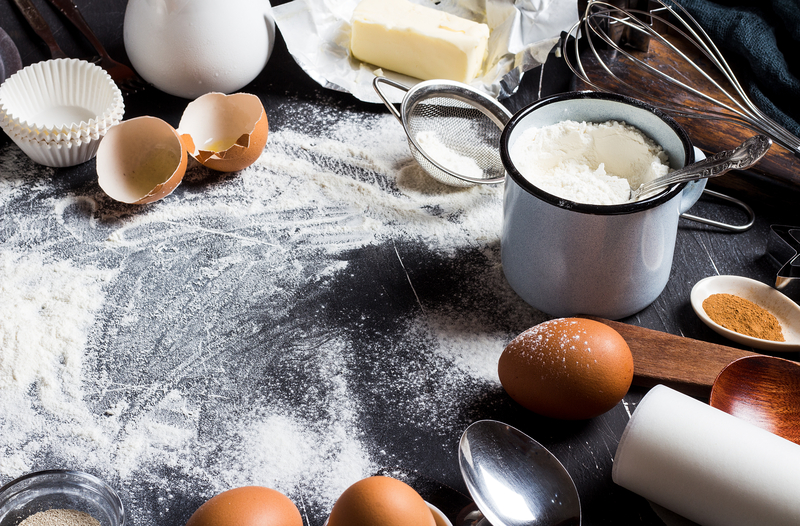 Baking is not merely a culinary activity; it’s a therapeutic experience that has captured the hearts of many across the globe.
Baking is not merely a culinary activity; it’s a therapeutic experience that has captured the hearts of many across the globe.
From warm, freshly baked cookies to aromatic bread straight from the oven, the process of baking can evoke a profound sense of joy and contentment.
But have you ever wondered why baking makes you feel happier?
In this article, we explore the psychological and physiological reasons behind the blissful feeling that arises when you roll up your sleeves and start baking.
The Science of Baking and Happiness
Baking’s impact on happiness lies in its scientific nature.
The process triggers the release of “feel-good” neurotransmitters like serotonin and dopamine, fostering pleasure and contentment.
Additionally, the mindful focus required during baking acts as a form of meditation, reducing stress.
The creative aspect allows self-expression, boosting self-esteem and promoting positivity.
The nostalgia associated with family recipes evokes happy memories, while sharing baked goods strengthens social bonds.
Accomplishing a baking project provides a sense of achievement, boosting confidence.
Aromatherapy through delightful scents like vanilla and cinnamon contributes to the overall happiness experienced during baking.
In essence, baking is a scientifically backed recipe for happiness.
Mindful Focus and Stress Reduction
 Baking’s mindful focus leads to stress reduction.
Baking’s mindful focus leads to stress reduction.
When baking, individuals concentrate fully on the process, blocking out distractions and entering a state of mindfulness.
This focused attention on measuring, mixing, and following recipes allows them to be present in the moment, which can alleviate stress and anxiety.
The act of baking becomes a form of meditation, calming the mind and providing a sense of peace.
As a result, engaging in the baking process can offer a therapeutic and enjoyable way to unwind and reduce the pressures of everyday life.
Creativity and Self-Expression
Baking fosters creativity and self-expression.
From experimenting with unique flavor combinations to designing intricate cake decorations, baking offers a canvas for imagination to flourish.
The process allows individuals to express their artistic side, elevating the act from mere cooking to a form of edible art.
Creating something from scratch and infusing it with personal flair provides a profound sense of achievement, boosting self-esteem and confidence.
Bakers can unleash their creativity without boundaries, making each baked good a reflection of their unique personality and style.
This freedom of expression contributes to the joy and fulfillment experienced while baking.
Nostalgia and Happy Memories
 Baking evokes nostalgia and happy memories.
Baking evokes nostalgia and happy memories.
Family recipes passed down through generations bring back cherished moments spent with loved ones.
The sweet aroma of a favorite childhood treat can instantly transport individuals to a time of warmth and joy.
Recreating these traditional bakes not only preserves culinary heritage but also creates new memories with loved ones.
The act of baking together fosters a sense of togetherness and strengthens familial bonds.
Nostalgia reminds us of the comforting and happy moments, infusing the baking experience with a profound sense of connection to the past and a deep appreciation for the present.
Social Connection and Sharing
Baking fosters social connection and sharing.
The act of baking together brings people closer, encouraging teamwork and cooperation.
Whether it’s a family baking session or a gathering with friends, the shared experience creates a sense of camaraderie and bonding.
Additionally, sharing baked goods with others is an act of generosity and kindness that elicits feelings of gratitude and joy in both the baker and the recipient.
Baked treats become a delightful way to celebrate special occasions, express love, or simply bring a smile to someone’s face.
The communal aspect of baking strengthens relationships and enhances the overall happiness of the experience.
Sense of Accomplishment
 Baking instills a profound sense of accomplishment.
Baking instills a profound sense of accomplishment.
As bakers follow each step of a recipe and witness the transformation of raw ingredients into delectable treats, they experience a genuine sense of achievement.
Completing a baking project, whether it’s a perfectly risen cake or a batch of perfectly golden cookies, brings a feeling of satisfaction and pride.
The tangible results of their efforts boost self-confidence and self-worth, reaffirming their culinary skills.
This sense of accomplishment transcends the kitchen, positively impacting other areas of life, as individuals carry the confidence gained from successful baking experiences into various aspects of their daily endeavors.
Aromatherapy and Baking
Aromatherapy and baking go hand in hand, creating a sensory delight that enhances happiness.
As baked goods rise and brown in the oven, they emit tantalizing aromas of vanilla, cinnamon, citrus, and more.
These scents trigger the olfactory system, which is closely linked to emotions and memories.
Aromatherapy studies have shown that certain smells, like those found in baking, can uplift spirits, reduce stress, and promote relaxation.
The pleasant aroma that fills the kitchen while baking creates a calming and soothing environment, contributing to the overall sense of well-being and contentment experienced during the baking process.
Bottom Line – Why Baking Makes You Feel Happier?
 The joy and happiness experienced during baking can be attributed to a combination of scientific, psychological, and emotional factors.
The joy and happiness experienced during baking can be attributed to a combination of scientific, psychological, and emotional factors.
From the release of “feel-good” chemicals in the brain to the mindful focus, creativity, and social connection, baking offers a myriad of benefits for our well-being.
So, the next time you find yourself in need of a mood boost, consider donning an apron, preheating the oven, and indulging in the therapeutic art of baking.
Your taste buds and your mind will thank you for it!


